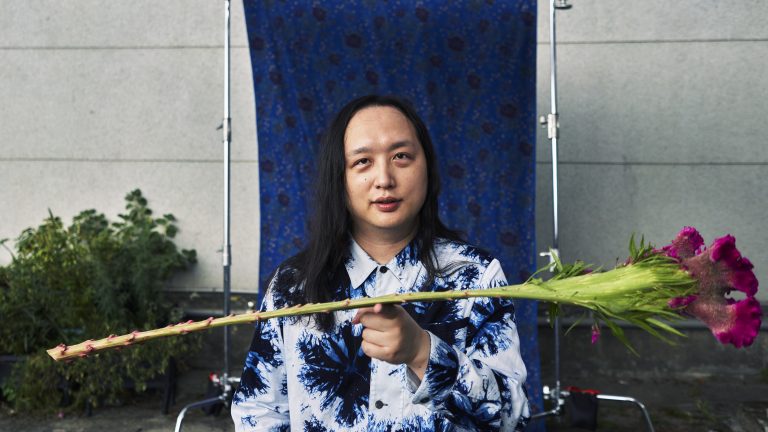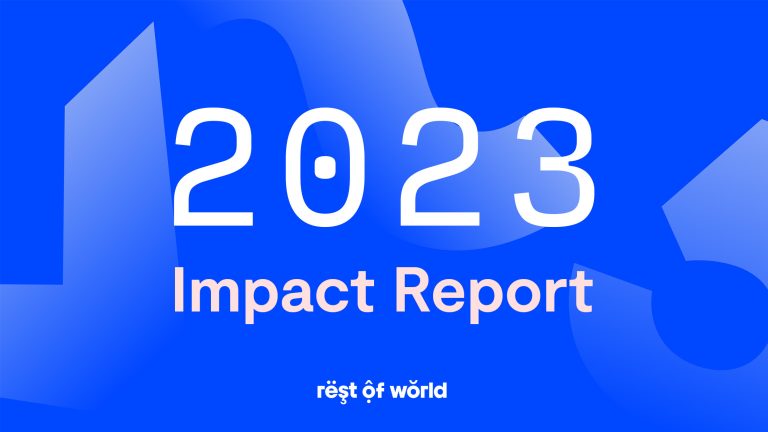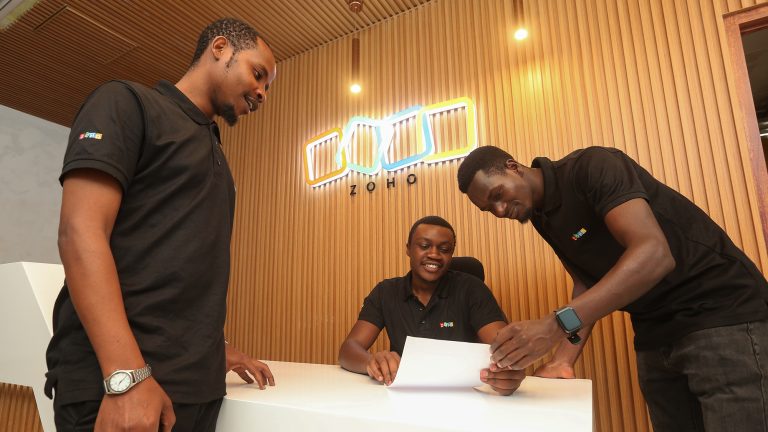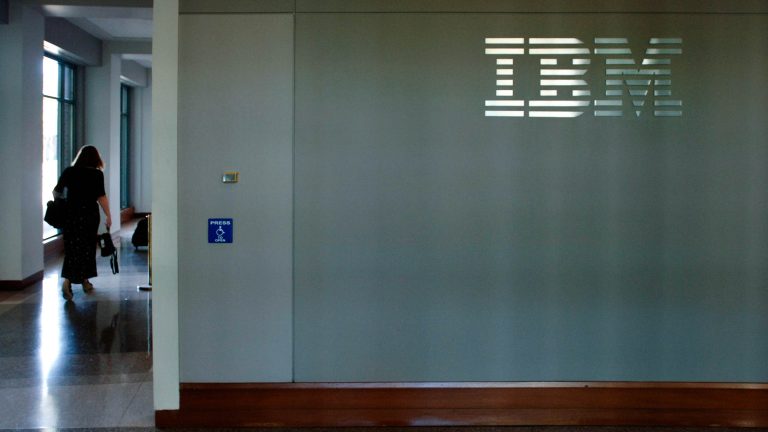“Civil Rap Song,” a track by the Japanese hip-hop trio Dos Monos, begins not with an MC’s rhymes but a faraway voice speaking slow, bureaucratic English. The deconstructed audio is sampled over gloomy synth: “If you overemphasize … amplifying the public and private sector … where is the civic sector? … where is the social sector?” Made in less than a week during Japan’s state of emergency over Covid-19, the track was intended to be “culturally empowering,” according to a band member — a way to remind the public that it still had choices, even in the midst of a crisis.
The speaker in the song is 39-year-old Audrey Tang, a prodigy hacker turned activist turned digital minister in the Taiwanese government. Tang, who wears rimless glasses and dark, baggy clothes by Issey Miyake, does not fit the profile of a rapper’s muse. Yet over the course of the coronavirus pandemic, which her country has managed with singular, tech-enabled ease, she has become an international messenger of Taiwan’s “radically transparent” “digital democracy.” For Tang, the Taiwanese model offers an imitable middle ground: between the internet and personal privacy; between corporate interests and the welfare state.
Before Covid-19, you may have heard of Tang if you followed Taiwanese news, tech gossip, or transgender politics. She is considered one of Taiwan’s top coders, having taught herself the programming languages Haskell and Perl before developing software for Apple that would be used in Siri. In the spring of 2014, when news that Taiwan’s then-president Ma Ying-jeou had threatened the island nation’s independence by attempting to force through a trade deal with China, Tang quit a job at Socialtext, where she worked on Google Suite–like productivity software, to join a scrum of hackers gathered outside the main government building in Taipei. This was the beginning of the Sunflower Movement, a popular uprising against the prospect of national absorption, and Tang helped broadcast the protests and debates online. After a nearly monthlong occupation, Ma was forced to abandon the pact, and the Sunflower activists turned to political organizing. They successfully ran progressive candidates in the 2014 local elections and, in 2016, elected Tsai Ing-wen as president. Tsai’s administration recruited Tang to become the first out transgender person in Taiwan’s executive cabinet.
While Tang’s title is “digital minister,” she is a minister without a ministry. As one of nine “horizontal ministers,” she advises other parts of the government on all things tech — and, because she happens to be obsessed with the U.N.’s Sustainable Development Goals — environmental overlaps. In 2017, for instance, she and her staff worked with the Ministry of the Interior and a risk-management agency to combine separate systems used to prevent and respond to natural disasters. Upon Tang’s recommendation, the government agreed to implement a new cloud-based interface to trim costs and give the public quick, easy access to information on floods, fires, and extreme weather. Last year, during the second “presidential hackathon,” an annual event that invites startup-style ideas for governance, she helped facilitate the development of a solar-powered device that can measure and log water-pollution levels on an open-source blockchain. Soon, any citizen worried about downstream industrial waste will be able to buy a few of these monitors, drop them in a creek, and create a dataset to hold corporations and local officials accountable to environmental regulations.
This is clearly government work, but Tang, at her core a hacker iconoclast, bristles at the notion that she works for Taipei. She still prefers to see herself as a liaison, or, in her words, “a moderator or editor,” between the public and the state. This explains why Tang — though not a doctor or epidemiologist — found herself at the center of Taiwan’s response to Covid-19.

When rumors of a dangerous flu emerged from Wuhan, China, last December, the Taiwanese reacted fast. Carrying the memory of the 2003 SARS epidemic, they rushed to buy face masks, threatening to deplete local supplies. In the city of Tainan, an engineer named Howard Wu created a fix: a mapping system to track available masks, using Google GPS and Places API. The platform was an immediate hit. Tang reached out to Wu and secured funding from Google to support and extend the project, which eventually inspired a similar system in South Korea. By spring, the Taiwanese government was managing the supply and distribution of cheap N95-type masks through neighborhood pharmacies. All 24 million residents of Taiwan could buy a certain number per week, at any pharmacy, based on their national health insurance card. Long lines got shorter, and people went about social distancing with confidence. The success of this model — Taiwan has had fewer than 500 total cases and just seven deaths — was what attracted the Dos Monos rappers to Tang.
It helped that, in East Asia, masks were “already ‘natural’ before the pandemic; we didn’t have to invent new things,” Tang said. In response to the common, mostly Western critique that East Asian technocracy relies too much on digital surveillance, Tang explained that Taiwan’s containment method involved “a deep but very narrow and time-limited privacy infringement: You either, when flying back, go to the quarantine hotel for 14 days, or you can choose the digital fence,” that is, submit to strict tracking. “We do not collect new data,” she added. “It’s not a new app. It’s not GPS. People understand it’s proportional.” Taiwan also invested in fact-checking startups and enlisted comedians to craft lighthearted responses to Covid-19 disinformation and consumer misbehavior. In a public-service announcement intended to stem panic-buying of toilet paper, a cartoon version of Tang’s boss, Premier Su Tseng-chang, shimmies his rear end beneath the words, “You only have one butt.”
When I spoke with Tang via Skype in July, she referred to Taiwan as “post-pandemic.” The country had never shut down completely, and its streets, markets, and schools were beginning to feel normal. She had just made her morning commute in downtown Taipei, a 15-minute walk from Da’an Park, past the Jianguo flower market, to a broad concrete complex surrounded by lush trees. There, in an open-air arcade that once belonged to the air force, is the Social Innovation Lab, the headquarters of Tang’s digital non-ministry. She dialed in from her office, which resembled the lounge of a coworking space. A vertical Chinese scroll hung over her right shoulder: “More and more graceful every day.”
Tang had been holding public “office hours” on Tuesdays and Wednesdays and was booked through September to chat with locals about tech and government policy, entrepreneurship, and sustainability. Nearly all her interactions, including media interviews and meetings with lobbyists, are subject to a “radical transparency” policy: They are recorded, transcribed, and posted online for all to see. Tang also holds regular virtual visits with communities all over Taiwan.
“Any top-down, coercion, whether it’s from the capitalists or from the state, is equally bad.”
During a recent one, entrepreneurs from Taiwan’s indigenous community pressed for changes to the business code. Tang listened and recalled a solution she helped devise last year, when Taiwan became the first Asian country to legalize same-sex marriage. Many older, conservative Taiwanese could accept that gay people should have equal rights but felt reluctant to have their extended-family registries — official, patrilineal records stretching back to the early 20th century — reflect LGBT unions. The fix was a “hyperlink act” that, with a single click, would amend relevant sections of the civil code to give queer couples the same rights and duties as anyone else but would not, as with straight marriages, “hyperlink to the in-laws,” meaning that the families of the same-sex couple wouldn’t be permanently bonded in the eyes of the state. “Their families don’t wed. It’s the individuals that wed,” she told me. “It’s a social innovation that convinced both generations that the values that they cherish are not disrupted when we pass marriage equality. It’s marriage equality with intergenerational solidarity.”
It’s also a compromise. Tang, whose mother was active in Taiwan’s cooperative movement before the country transitioned to democracy, much prefers collaboration to battle. This might relate as well to another aspect of Tang’s childhood: she was born with a heart defect and often talks about the virtues of unhurried observation. “If you’re slow in your motion, you tend to notice other, nonhuman beings,” she told me — trees, rivers, computers. As digital minister, she invoked this cooperative ideal to implement Pol.is, an online discussion board where Taiwanese people can engage in a “rough-consensus process” about social issues, such as what sorts of rules should govern Uber or how best to combat the spread of revenge porn. To prevent trolling, the platform functions without a reply button.
Taiwan’s constitution prohibits private businesses from acting against “the balanced development of national wealth and people’s livelihood,” yet the country’s most famous corporation is high-tech Apple supplier Foxconn, which gained notoriety for driving its mainland Chinese factory workers to suicide. I asked whether the cruelties of big businesses hadn’t dimmed Tang’s faith in the possibility of social equilibrium. “The manufacturing companies, they learned, of course, not to do [things with] adverse effects within Taiwan proper,” she replied, referring to Foxconn’s compounds in mainland China. But the next generation of Taiwanese entrepreneurs, she said, will use robotics to reduce worker exploitation, embrace “worker associations,” and pursue something “other than a purely for-profit, bottom line.” Why the techno-idealistic faith in enterprise? Tang is mindful of Taiwan’s recent history of dictatorship, and as a self-professed “conservative anarchist,” she said, “Any top-down, coercion, whether it’s from the capitalists or from the state, is equally bad.”
The state in question is not only Taiwan but also China. Like all Taiwanese people, Tang has kept close watch on Hong Kong in recent months, as China has tightened control in physical and cyber space. “All this feels rather familiar because my dad’s Ph.D. was on the dynamic of the Tiananmen protests,” she said. When Tang was a child, she and her brother and mother accompanied him to study for a year in Saarbrücken, Germany. “My household living room was full of his research subjects, who were people in their early 20s, freshly frustrated from Tiananmen and continuing their education in Europe.” In recent months, Tang has met with many people who had to flee Hong Kong. Taiwan now, like Europe back then, is a place of sanctuary.
I asked Tang if she fears for the future of Taiwan — if the Chinese internet, to say nothing of its real-life analogs, could wipe out the digital democracy that she’s helped construct since the Sunflower Movement. “The crackdown of Hong Kong is hinged on the premise that, if you have too much democracy, it will hurt, I guess, stability, harmony, economy,” she said. “We have a responsibility to show that democracy works, and not just lockdown or top-down or takedown.”



